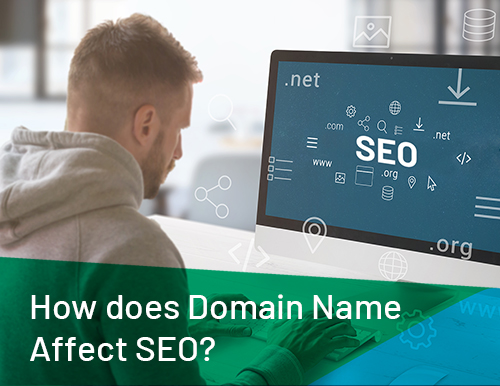 Short answer: yes. But let's find out why. As a business owner, choosing a domain name is a big deal as it becomes the business' online identity. If you are in the process of launching your business online, you may plan to use a search engine optimisation manager to get traffic to your site once it's built; however, you may not be aware that you've been making decisions that may affect your SEO before you even registered your domain name for your business. Many people find choosing a domain name daunting because, if they pick the one, there's no going back. The key is to balance your priorities between SEO and authentic branding but, first, let's break down the elements of a domain name. There are two parts to every domain name There are two choices every business owner has to make when selecting their domain name; the domain name itself and the extension. The domain extension is the combination of letters that follow the dot after your domain name. For example, in webcentral.com.au:
Short answer: yes. But let's find out why. As a business owner, choosing a domain name is a big deal as it becomes the business' online identity. If you are in the process of launching your business online, you may plan to use a search engine optimisation manager to get traffic to your site once it's built; however, you may not be aware that you've been making decisions that may affect your SEO before you even registered your domain name for your business. Many people find choosing a domain name daunting because, if they pick the one, there's no going back. The key is to balance your priorities between SEO and authentic branding but, first, let's break down the elements of a domain name. There are two parts to every domain name There are two choices every business owner has to make when selecting their domain name; the domain name itself and the extension. The domain extension is the combination of letters that follow the dot after your domain name. For example, in webcentral.com.au:
- The domain name is "webcentral"
- The domain extension is ".com.au"
There are a number of different domain extensions available to register and each will have a differing affect on your SEO. Top Level Domains (TLDs) are the most common domains and have a global reach. This means that they are not limited by industry or geographical location. Anyone can register a TLD. The most well known TLDs are .com, .net and org. Anyone can register a TLD. Country Code Top Level Domains (ccTLDs) provide an extra layer of information to the search engine that helps it sort through the web to provide relevant results to the searcher. A ccTLD helps search engines understand your site and audience by geo-location. For example, .com.au lets Google know your business operates in Australia. This affects where and when your website will be listed in the search engine results pages. If a business has a .co.uk website, it's unlikely to reach Australian consumers in generic searches. You must have an ABN to register a .com.au domain. Generic Top Level Domains (gTLDs) encompass domain extensions beyond TLDs and ccTLDs, like .biz and .info. Recently there have been new gTLDs released, including .melbourne, .sydney and even .ninja. Most gTLDs can be registered by anyone anywhere in the world; however, there are some governed by agencies or organisations, like .gov and .edu. These require specific eligibility to register. It depends on which gTLD you select as to the SEO potential. Your domain name will also impact your business' SEO efforts to some extent, but not as much as you might think... 
How to choose the right domain extension
To choose the right domain name, you first need to understand how search engines work. Their goal is to show the most relevant search results to the searcher. If the searcher is located in Australia, search results based in New Zealand are not likely to be useful. You also need to know your audience. If your customer demographic is worldwide, then a TLD, like .com is the best option for you; but choosing a global TLD is not going to be the best choice for a local business. In that case, choosing a ccTLD, like .com.au will enable search engines to identify that your business is focused on the Australian market. Then, combining this with other on-site SEO services, such as Google My Business and Google Maps, you'll be able to accurately place your listings in front of the right audience. This also helps you narrow your audience further so that people searching for businesses in Sydney won't see listings from Brisbane or Melbourne. The last thing to consider is branding. This is where the balancing act comes into play. With new gTLDs popping up all the time, it may be of benefit to stand out from the pack with a gTLD. For example, if your business is called "[Brand Name] Group," a .group may be a memorable option for your business. However, the impact a gTLD will have on your SEO plans is largely case by case, so you will need to weigh up the drawbacks against the benefits of the name for your brand. Still unsure of which domain to choose? Check out our article on questions to ask when deciding between .com and .com.au today. Best practice is to buy both the .com.au and .com domain extensions for your business for brand protection, in case you plan to expand your business globally in the future. You can also point both of them to your single existing website so you get capture the traffic from both.
Need the right domain? Check your domain names here!
from$14.95/year
New .au domains arriving soon
Did you know that you have an additional ccTLD to choose from starting March this year? This new domain could benefit your business if you are eligible to register. Not only does a .au domain name proudly displays your Australian presence, it is also much shorter and easier for your customers to type. Learn about the benefits of this new .au direct domain name to find out more!
How to pick your domain name
First thing's first. You do not need to insert keywords into your domain name to get your site to rank. Search engines are fully aware of business owners stuffing keywords into their domain in an attempt to manipulate search results and have adjusted their algorithms to reduce the impact of this tactic. Instead, focus on choosing a domain name that represents your brand best for marketing purposes. Yelp, Wikipedia and TripAdvisor are not keywords for their niche but they rank on the first page of Google for thousands of terms. Why? Because they are using other SEO management services, such as Google My Business and Google Maps, authoritative link building and a smart keyword strategy to better rank their pages. Ultimately, out of the 200 SEO factors that determine where a website sits on Google, a website's domain name carries very little weight. From an overall marketing point of view, you're better off choosing a domain name that reflects your business than filling it with industry-related keywords. With over 20 years' as a local domain provider, Webcentral is the #1 choice for Australian small businesses. Search for your new online identity today.

-min.png)

